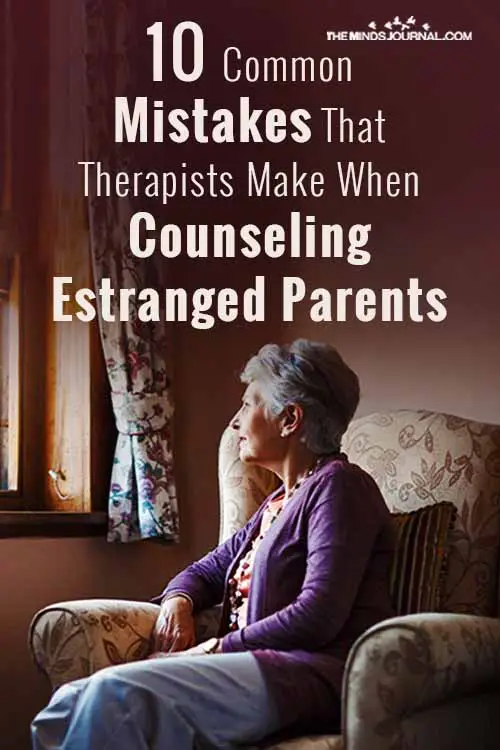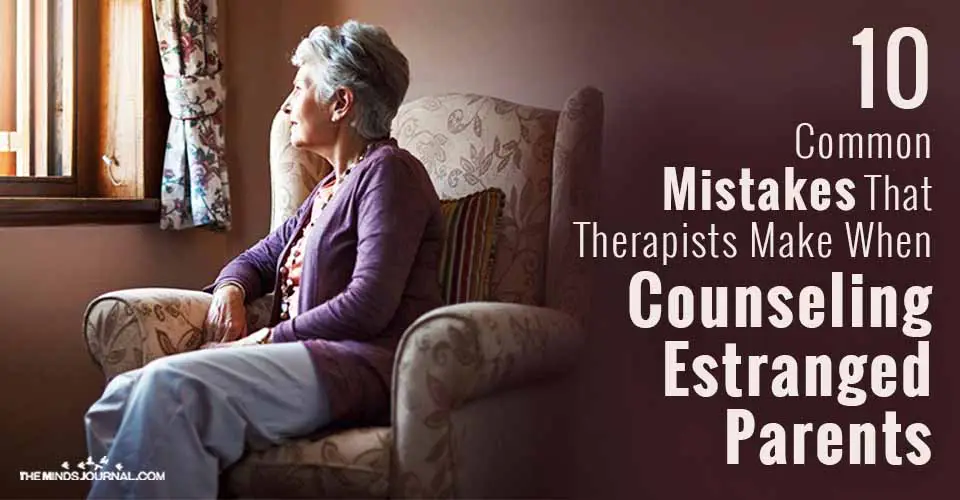Do you know that just like therapists can help solve parental issues, there are a few mistakes that therapists do make with estranged parents?
Here Are 10 Common Mistakes Therapists Make With Estranged Parents
1. Blaming the parent.
While it’s potentially forgivable that the general populace doesn’t yet know that a decent and dedicated parent can become estranged, there’s no excuse for a therapist failing to know that.
Many therapists, without evidence, assume that the parent is the primary cause of estrangement and as a result, perpetuate feelings of shame and guilt.
2. Not helping the parent acknowledge the legitimate complaints of the adult child.
On the other hand, some therapists believe that it’s their job to support the parent no matter how problematic their behavior. In doing so, they fail to challenge the parent’s behavior that either led to the estrangement or continues to perpetuate it.
3. Giving bad advice.
It’s not uncommon for therapists to encourage estranged parents to be overly assertive or confrontive with their estranged adult children.
This advice imagines that the parent has more power and influence than they commonly do once an estrangement is in place.
Therapists with this orientation fail to recognize that being more assertive and confrontive with an estranged adult child typically worsens, rather than betters the parent’s situation. It causes the adult child to feel hurt or misunderstood and to further their resolve to keep their distance.
Want to know more about how you can have a healthy parent-child relationship? Read 10 Do’s and Don’ts To Keep Your Parenting Healthy and Non-Toxic
4. Failing to understand the power of a letter of amends to the estranged adult child.
The road to a potential reconciliation almost always starts with the parent’s acknowledgment of their past mistakes, however small.
Therapists who don’t help their clients find the kernel of truth in the estranged child’s complaints miss a critical and often necessary opportunity for repair.
5. Being too reassuring.
It’s common that not only friends but therapists are overly reassuring about the chance for a future reconciliation: “They’ll be back;” “They’ll remember all that you’ve done for them;” “It’s just a phase.”
While sometimes those predictions are accurate, no one knows for sure if or when an estrangement will end. False reassurance is no assurance at all. Better to help the client practice radical acceptance and self-compassion.
6. Failing to take an adequate history of the parent and their estranged child.
It’s inappropriate to give advice to an estranged parent without first getting a detailed developmental history of the parent and of the now-grown child.
Otherwise, a therapist wouldn’t be able to determine the influence of parental mistakes or the influence of long-standing issues in the child such as learning disabilities, mental illness, addiction, or other challenges.
7. Failing to understand the power of a motivated son-in-law or daughter-in-law.
The troubled spouse of an adult child can create an estrangement where one wouldn’t ordinarily exist by saying, “Choose them or me.”
Want to know more about how you can have a better relationship with your in-laws? Read 5 Rules For Living With Your In-Laws (and Making It Work)
8. Failing to understand the long-term impact and damage to parental alienation.
Parental alienation often begins when children are young, though alienation can occur at any age. Either way, research shows that the damage may be lifelong to both the targeted parent and the alienated child.
Therapists who are unfamiliar with these realities may damage the self-esteem of their clients and fail to provide them with an accurate understanding of the etiology of the problems.
In addition, they may provide strategies and interventions that are counter to what is likely to increase the chance of a reconciliation.
9. Being unwilling to interview people related to the estrangement.
Sometimes a 360-degree view is required before the right intervention is discovered.
This may mean interviewing aunts, uncles, grandparents, or even ex-spouses to determine what steps need to be put in place to maximize the chance of a potential reconciliation.
10. Not being willing to reach out to the estranged adult child.
While the estranged child may be unwilling to talk to the parent, they are often willing to provide the parent’s therapist with information about their perspective that can prove critical to a potential reconciliation.
References:
- Amy Baker, “Parental Alienation: A Special Case of Parental Rejection,” Parental Acceptance 4, no. 3 (2010): 4–5; Amy Baker and N. Ben Ami, “Adult Re-call of Childhood Psychological Maltreatment in Adult Children of Divorce: Prevalence and Associations with Outcomes,” Journal of Divorce and Remarriage 52, no. 4 (2011): 203–19.
- Kristina M. Scharp, Lindsey J. Thomas, and Christina G. Paxman, ‘It Was the Straw That Broke the Camel’s Back’: Exploring the Distancing Processes Communicatively Constructed in Parent-Child Estrangement Backstories,” Journal of Family Communication 15, no. 4 (2015): 330–48.
- Joshua Coleman, Philip Cowan, and Carolyn Pape Cowan, “The Cost of Blaming Parents,” Greater Good magazine, Berkeley, California. Joshua Coleman, “Rules of Estrangement: Why Adult Children Cut Ties and How to Heal the Conflict” (New York: Harmony/Random House).
- Becca Bland, “I Am Estranged from My Family,” https://www.theguardian.com/uk/lifeandstyle andstyle/2012/dec/15/becca-bland-estranged-parents; Kylie Agllias, “Disconnection and Decision- Making: Adult Children Explain Their Reasons for Estranging from Parents,” Australian Social Work 69(1) (2016a): 92–104, http:// doi.org/10.1080/0312407X.2015.1004355; Blake and Bland, University of Cambridge Centre for Family Research and Stand Alone
- Jennifer J. Harman, Edward Kruk, and Denise A. Hines, “Parental Alienating Behaviors: An Unacknowledged Form of Family Violence,” Psychological Bulletin, 144, no. 12 (2018)
- Joshua Coleman is the author of numerous articles and chapters and has written three books:
- When Parents Hurt: Compassionate Strategies When You and Your Grown Child Don’t Get Along (HarperCollins, 2007)
- The Lazy Husband: How to Get Men to Do More Parenting and Housework (St. Martin’s Press, 2006)
- The Marriage Makeover: Finding Happiness in Imperfect Harmony (St. Martin’s Press, 2004)
His new book: RULES OF ESTRANGEMENT will be released in Nov 2020
Written By Joshua Coleman
Originally Appeared In Psychology Today
Even though therapists can be a godsend when it comes to solving many deep-seated problems between parents and children, they can also end up making a few mistakes. If you see any of these signs in your therapist, then maybe they are not the right fit for you.
If you want to know more about the mistakes that therapists make with estranged parents, then check this video out below:









Leave a Reply
You must be logged in to post a comment.